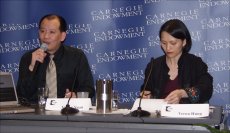Registration
You will receive an email confirming your registration.
IMGXYZ306IMGZYXVictor Yuan, Founder and CEO of Horizon Research, China's leading private market research firm, delivered a presentation "Taking the Pulse of the Chinese Public: How Do Ordinary Chinese View Their Society, Government and Foreign Countries?" at a lunch forum hosted by Carnegie's China program. Veron Hung, Associate on the China program, moderated the event.
Yuan divided his presentation into three main categories: first, how ordinary Chinese people assess their current life and future; second, how they perceive international issues; and third, their feelings and perceptions of issues pertaining to daily life.
Current Life and Future
Using a five degree scale, Yuan found that ordinary Chinese generally keep a middle to high level of satisfaction with the quality of their life. Overall, the level of satisfaction is higher in rural than urban areas, which means that poorer Chinese are more satisfied with their lives than richer Chinese.
Looking at specific macro factors, Yuan's study indicates that interviewees have a positive outlook on many issues. They have a high assessment of the change in China's international status over the past several years. People are also generally satisfied with the current economic development of China-seventy percent of respondents felt optimistic about China's economic development. With respect to China's development in science and technology, interviewees once again view China's progression optimistically. Yuan noted that the findings of positive feelings towards these macro factors do not necessarily arise from a clear understanding of the issues. For example, Yuan's survey found that about 70 percent of people in the rural areas had heard about the WTO issue, but 80 percent of people did not understand the impact of the WTO on their daily life. Yuan observed that these findings indicate that public opinion continues to be strongly shaped by official news media.
Yuan's surveys found that people generally give the government high marks on its handling of economic development and international issues. However, the government received lower scores on the issues of clean government and the creation of employment opportunities. Yuan's studies have found that the last few years have seen a reshuffling in the priority ordinary citizens give to various social topics. In 1999, the top social issue of concern was clean government; by 2001, employment opportunities replaced clean government as the most important issue and in 2002 employment opportunities received an even higher percentage of importance. Meanwhile, clean government disappeared in 2002 from the list of most important social issues.
International Issues
Yuan's surveys found that more urban than rural residents follow international news through newspapers and the internet. On balance, more news sources now follow international news-both public and privately owned papers and magazines.
Respondents to Yuan's surveys listed world terrorism and the Taiwan Strait issues as the two factors that will most affect world peace in the coming five years. Asked which country is most friendly to China at the beginning of 2002, the Chinese ranked Singapore first, then Russia, North Korea and South Korea. Iran also ranked among the top. Economically, however, the United States continues to rank number one as the most important country to China. Japan is second, followed by Russia.
Issues of Daily Life
Yuan's surveys also looked at the perception of many micro life factors in China (i.e. income, consumption, social security, employment and community environment). Confidence in these micro factors was low. This finding is contrary to conventional research that holds that citizens will often view the micro factors of their lives with greater confidence than the macro factors of their nation.
Yuan found that the spending habits of average Chinese are changing. The amount of money spent on food is continuously declining, which more money is being invested in housing, clothing and entertainment. Sixty percent of respondents also indicated that the majority of their money is put into saving accounts.
